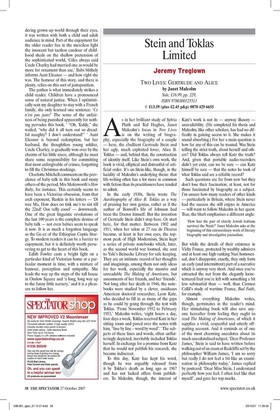Stein and Toklas Limited
Jeremy Treglown Two LIVES: GERTRUDE AND ALICE by Janet Malcolm Yale, £16.99, pp. 229, ISBN 9780300125511 © £13.59 (plus £2.45 p&p) 0870 429 6655 Asin her brilliant study of Sylvia Plath and Ted Hughes, Janet Malcolm's focus in Two Lives is on the writing of biography, especially the biography of a couple — here, the ebullient Gertrude Stein and her ugly, much exploited lover, Alice B. Toklas — and, behind that, the construction of identity itself. Like Stein's own work, the book is vivid, elliptical and distrustful of artificial order. It's un-Stein-like, though, in the lucidity of Malcolm's underlying thesis: that life-writing often has a lot more in common with fiction than its practitioners have tended to admit.
In the early 1930s, Stein wrote The Autobiography of Alice B. Toklas as a way of praising her own genius, rather as if the author of Boswell's life of Johnson had been the Doctor himself. But the invention of Gertrude Stein didn't stop here. Or start here, for that matter. Between 1902 and 1911, when her salon at 27 rue de Fleurus became, at least in her own eyes, the topmost peak of High Modernism, Stein kept a series of private notebooks which, later, as the second world war loomed, she sent to Yale's Beinecke Library for safe keeping. They are an intimate record of her thoughts and imaginings, among them not only ideas for her work, especially the massive and unreadable The Making of Americans, but assessments of her friends, and her 'friends'. Not long after her death in 1946, the notebooks were studied by a clever, assiduous American doctoral researcher, Leon Katz, who decided to fill in as many of the gaps as he could by going through the text with Toklas. 'From November 1952 to February 1953,' Malcolm writes, 'eight hours a day, four days a week, Toklas received Katz in her sitting room and pored over the notes with him, "line by line – word by word": The subjects of these lines and words, often unflatteringly depicted, inevitably included Toklas herself. In exchange for a promise from Katz that he would not publish his research, she became indiscreet.
To this day, Katz has kept his word, though he was arguably released from it by Toklas's death as long ago as 1967 and has not lacked offers from publishers. To Malcolm, though, the interest of Katz's work is not its — anyway illusory — unavailability. (He completed his thesis and Malcolm, like other scholars, has had no difficulty in gaining access to it. She makes it sound absorbing.) For her a main question is how far any of this can be trusted. Was Stein telling the strict truth, about herself and others? Did Toklas always tell Katz the truth? And, given that portable audio-recorders didn't yet exist, can we be sure — can Katz himself be sure — that the notes he took of what Toklas said are a reliable record?
Such questions are far from new but they don't lose their fascination; at least, not for those fascinated by biography as a subject. I'm unsure how many readers of other kinds — particularly in Britain, where Stein never had the success she still enjoys in America — will want to follow Malcolm in her quest. True, the blurb emphasises a different angle: 'How had the pair of elderly Jewish lesbians survived the Nazis?' Janet Malcolm asks at the beginning of this extraordinary work of literary biography and investigative journalism.
But while the details of their existence in Vichy France, protected by wealthy admirers and at least one high-ranking Nazi homosexual, don't disappoint, exactly, they only form an early (and intermittent) part of a narrative which is anyway very short. And once you've extracted the nut from the elegantly loosetextured fruit you're left with something a bit less substantial than — well, than Carmen Callil's study of wartime France, Bad Faith, for example.
Almost everything Malcolm writes, though, germinates in the reader's mind. Her stimulating book will also save anyone hereafter from feeling they ought to read The Making of Americans, of which it supplies a vivid, respectful and utterly offputting account. And it reminds us of one of the most charming anecdotes about its much anecdotalised subject. 'Dear Professor James,' Stein is said to have written before walking out of an exam at Radcliffe set by the philosopher William James, 'I am so sorry but really I do not feel a bit like an examination in philosophy today.' James replied by postcard: 'Dear Miss Stein, I understand perfectly how you feel. I often feel like that myself', and gave her top marks.


































































 Previous page
Previous page